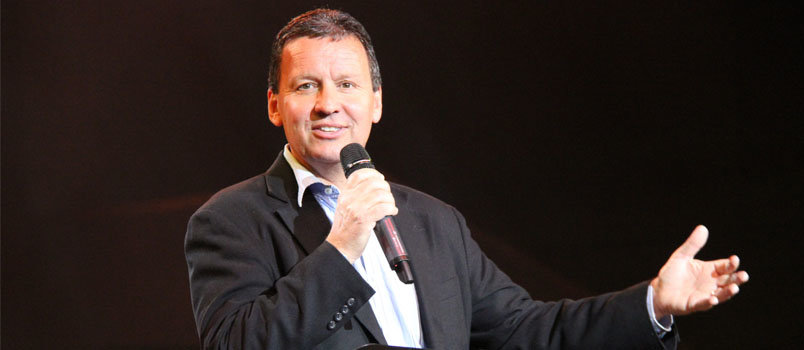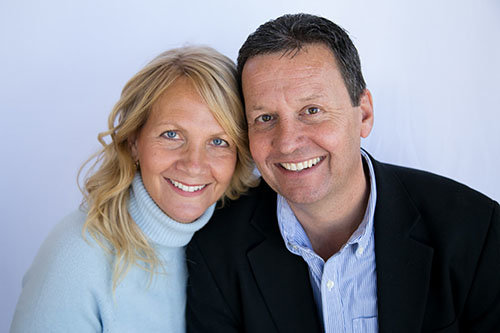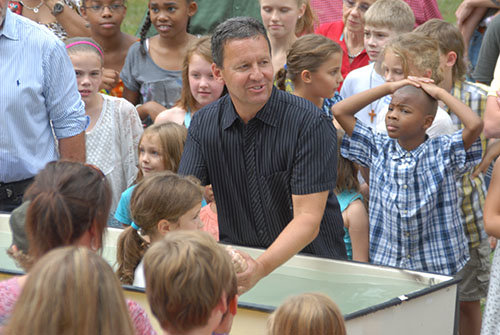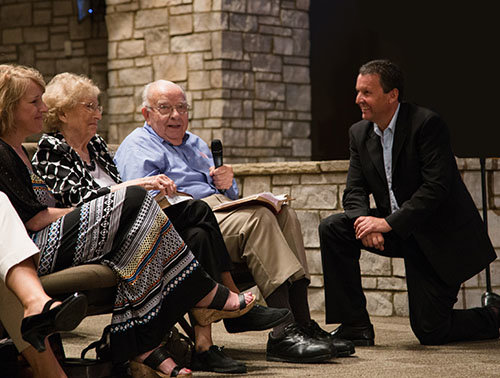 Pastor Rhys Stenner preaches to New Hope Baptist Church in Fayetteville. Stenner recently sat down with Index Editor Gerald Harris to talk about the United States, Stenner's native England, rugby, and his thoughts the American church. NEW HOPE/Special
Pastor Rhys Stenner preaches to New Hope Baptist Church in Fayetteville. Stenner recently sat down with Index Editor Gerald Harris to talk about the United States, Stenner's native England, rugby, and his thoughts the American church. NEW HOPE/SpecialThe Christian Index recently had the privilege of interviewing Rhys Stenner, pastor of New Hope Baptist Church in Fayetteville. The church’s recent history with pastors like Ike Reighard and John Avant has been quite remarkable, but when Pastor Stenner picked up the mantle of leadership in the Fayette County church God seemed to smile upon the fellowship with additional favor.
The affable pastor from the United Kingdom is among the most personable and gifted servants of God anyone would ever want to meet. At age 18 Stenner began his studies at the London School of Theology and prior to coming to New Hope was pastor of Holland Road Baptist Church in Brighton and Hove, England.
New Hope is a diverse congregation with two locations in the South Metro Atlanta area. The church with a worship attendance of nearly 2,000 is well known for its commitment to missions. You will be fascinated as you read Stenner’s answers about his background and discover his insights into serving Christ in America.
Index: Pastor Rhys, what were the circumstances that led to your salvation experience as a young teenager?
Pastor Stenner: Back in the late 70s I thought I was a Christian because I was British! Hardly anybody I knew went to church, but the Christian story was considered foundational at most schools. We read and studied the Bible.
Punk rock was booming when my longtime friend Al Shaw was the biggest punk fan in my school. He was always in trouble. I was never in trouble, perhaps more out of fear than anything else.
One day he told me that he had become a Christian. I didn't realize that this was something that one had to become! He explained to me that I was a sinner, but God is holy and heaven is perfect. I deserved hell. But the good news is that Jesus bridged the gap between God and me through his death on the cross. Suddenly it all made sense. My heritage was not wasted, but I realized I needed to receive Christ for myself.
Index: I understand that your father died the same year you trusted Christ as your savior. How did you handle that as a teenager?
Stenner: My father’s death was a great tragedy. I believe the Lord used it in my life first to give me a strong sense of the urgency of the need to respond to the Gospel. It also showed me the love of a local church; and I trust it has given me a sense of empathy for those who go through trauma.
Index: What kind of success did you and your “punk rocker” friend have in sharing Christ in your school and what was the key to you having such success in sharing your faith?
 Rhys Stenner and his wife Louise were students in England when they met, soon becoming Christians around the same time and getting married. NEW HOPE/Special
Rhys Stenner and his wife Louise were students in England when they met, soon becoming Christians around the same time and getting married. NEW HOPE/SpecialPastor Stenner: The Lord ignited a fire in both Al and me. I knew of no one else who had received the new birth. People said he was more like an evangelist and I was like a pastor. We were both 14 years old. No one explained to us that we were supposed to be nervous about sharing our faith! And we were not, so we started telling a lot of friends in the corridor about Christ. We believe that around 40 students gave their lives to the Lord soon afterward.
Since it was not against the law to pray in school, we were given courage and essentially sang and preached to everyone at Teignmouth Grammar School in Devonshire, England until people either were converted or got fed up with us! We also formed a band that was ok, but we were really loud.
We began going to the local Baptist church, which was also experiencing a kind of revival that was very special. Many started coming to our church and several remain close friends. The key was entirely that God was at work, His Spirit was moving in our hearts and we simply had to tell as many as we could. Our naiveté blinded us to the dangers of offending others and we kept witnessing. We were brought before the headmaster on one occasion, who I believe was a Christian and he showed us great compassion.
Index: How did you and Louise meet and what kind of romantic scenario did you create to propose marriage to her?
Pastor Stenner: I was the support act to a Christian band, singing along with an ovation balladeer guitar. I was 19 years old and a fellow student at what was then called London Bible College when Louise Parsons gave me a lift home from the concert.
She was a year ahead of me so rarely took the trouble to talk to such a skinny fellow who had not lost any of his naiveté. We talked and realized that we had both been through tough family times. We were converted at a similar time and loved our Baptist church.
Louise was from Southend of the Thames. I cleaned many cars to save up for a ring, went into Bond Street, bought a diamond solitaire that I knew she would love, and proposed to her in a lovely oak-lined field in a place in North London called Hatfield. We are sure we could never find it today.
We married and began living back in Teignmouth. We lived all our lives by the sea until we came to Atlanta. We have three girls: Megan, Eleanor, and Sarah. Megan is married to Alex, who is from Mississippi, and they have a wonderful daughter, Brynlee.
Index: God blessed your pastorates with divine success in England. What was your greatest experience as a pastor prior to coming to the U.S.?
Stenner: It is difficult to select just one. My last two years at Teignmouth saw great favor with many being saved, baptized, and brought into the membership. There was a very sweet spirit that reminded me of the “revival” of the late 70s. The unity was so special.
At Holland Road from 1992 to 2005 there was great growth, a fast-growing team and the relationship with New Hope began. I led the evangelical alliance in Brighton and we saw incredible cooperation between the evangelical churches notably praying for revival and there was great unity. One of my greatest joys has been that the missions to Wales have continued and we have seen some amazing nights when many came to know the Lord.
Index: You have been in America for over a decade. How would you compare/contrast the spiritual climate in England to the spiritual climate in America?
Stenner: I was truly amazed at the impact that the American church has, the God-consciousness that has been healthily ingrained in the culture is powerful. It’s easy to forget that. The obvious spiritual decline that we have seen in the last decade sometimes blinds us to the fact that millions are still very, very receptive to the Gospel.
 Stenner baptizes a little girl. Evangelism and missions has long been a part of New Hope's identity. NEW HOPE/Special
Stenner baptizes a little girl. Evangelism and missions has long been a part of New Hope's identity. NEW HOPE/SpecialHowever, I don’t think it is unfair to say that the prevalent nominalism in so many churches is disturbing. Just when “Rome seems to be burning” we are all so distracted by triviality. It’s time to wake up. I applaud the leadership of Dr. Ronnie Floyd and Dr. Steve Gaines in calling us to pray and to a spiritual awakening.
The British scene has had its own level of decline. Baptists could do with a conservative resurgence theologically. There are still some bright spots. London is said to be experiencing numerical growth. The average church member does seem to have quite a high level of commitment. Essentially, the members of the church attend the church weekly. In fact, the attendance of the church is often significantly higher than the membership of the churches.
Index: What has your study of the Welsh revival of 1904 taught you? Is revival possible in America with our secular and humanistic influence today?
Stenner: When the revival began many had been attending church for Wales had been the land of many revivals. But enthusiasm was low so the pattern was repeated: those were weak days spiritually. There was great concern for the young people; and sports dominated the national consciousness. Sound familiar?
It took only a few to spark the fire of revival. I believe the prayers of Evan Roberts and his courage in calling young people to prayer and witness was key. He was a student. The thousands saved were mainly young. Most of the young men perished in World War I, but the Lord preserved the revival especially through missionary endeavors to India and Korea where great revival has since taken place.
God is still burdened for our nation, the nations, and who knows where the next revival will begin?
Index: New Hope is doing extremely well and your campus at Starr’s Mill is constructing new educational space in order to prepare for additional growth, but where do you see the church (in general) headed in America?
Stenner: Thanks so much for the encouragement. Yes we are greatly blessed, but are aware of how difficult ministry is today. We maintain a high vision of participation in worship, Sunday school family groups, Wednesday night leadership development, and of course ministering to all age groups and giving and going into many nations. We believe that each local church can be part of the transformation of a lost culture.
We must be a revived people. This means that the life of Jesus must be fresh in each one of us. All of us are called to minister. There's no place anymore for the consumer Christian. Consumer churches will turn out to be unable to face growing secularism.
We simply must be sold out. We must be committed. We must pattern ourselves on The New Testament. It grieves me greatly when we can be attracted more to what is cool than to Christ himself. I have no doubt that if we all are passionate for Christ that it will fuel incredible creativity in our churches
I believe the leadership of Southern Baptist churches is essential because few seem to be really standing for truth and standing for truth on the controversial issues of our time. So it's time for a change. We need to get back to the Word. We must have a fresh passion for evangelism and worry a lot less about being cool. Neither should we be clumsy and irrelevant to those around us. Like Daniel we need to speak with wisdom and tact.
Index: What is your greatest challenge in being a pastor in America?
Stenner: We all have blind spots. So, I ask myself and my team every day to check the various cultural viewpoints in our church to makes sure I’m not breaking any laws or causing unnecessary offence. Nonetheless, to preach the Gospel and to be salt and light the church will be offensive to an increasingly secular culture. So, I think the biggest challenge is not merely being culturally savvy myself, but helping our church and churches see the dangers of our various American cultures seeping into Bible living. In other words, helping New Hope live out Romans 12:2.
Index: What is your greatest joy in being a pastor in America?
Pastor Stenner: I love the spirit at the festival times especially between Thanksgiving and Christmas. It’s a huge honor to be able to preach the Gospel to thousands and thousands in that season. Also things like the DNOW (Discipleship Now) and VBS of “Kids’ Week” are events where there is a strong expectation of success and everybody pulls together.
 Stenner chats on stage with Lester and Charlotte Bray, members of New Hope since 1939. NEW HOPE/Special
Stenner chats on stage with Lester and Charlotte Bray, members of New Hope since 1939. NEW HOPE/SpecialIndex: New Hope’s mission work in Wales is unique because of your connection with the national rugby team. How has that enhanced you mission work there?
Stenner: I am so thankful that New Hope has faithfully supported the missions to Wales for 15 years. We believe we have taken the Gospel to 120,000 people. The New Hope Gospel choir has performed at least 80 times. We have seen 50, 60, 75 people saved some nights.
My grandfather was a famous Welsh rugby player and he especially took me under his wing. I grew up around famous players and so before I was converted God was preparing me to be able to share the Gospel with several former internationals who have become friends, but also to be able to lead prayer at the rugby headquarters and even go along to a few training sessions.
Everything we do with rugby is unofficial, but it was very cool to be able to be around the team during the World Cup when Wales knocked out host England and became number two in the world. Our choir has performed in rugby clubs and has seen virtually all respond. I was invited to be a member of Ynysybwl Rugby Club. It was worth it just for the spelling. To God be the glory!
Lester and Charlotte Bray, members of New Hope since 1939, commented, “Pastor Rhys provides an excellent role model in the demonstration of servant leadership. He is God’s man in God’s time in the life of New Hope Baptist Church.”
Libby Baker, minister of childhood education, testified, “Pastor Rhys seeks wisdom from the Lord to give New Hope vision, guidance, and direction, rather than what might be the latest trend.”
“Pastor Rhys,” says Rick Nixon, another member, “is a man of God who is truly passionate about the Gospel and carrying out the Great Commission.”
Stenner has just written a book on apologetics entitled If In Doubt. Meet Rhys Stenner as he answers questions about his book in an interview with John Hull, pastor of Eastside Baptist Church in Marietta. The interview was a part of the programming of 100 Huntley Street, Canada’s longest running daily television show, hosted by Hull.